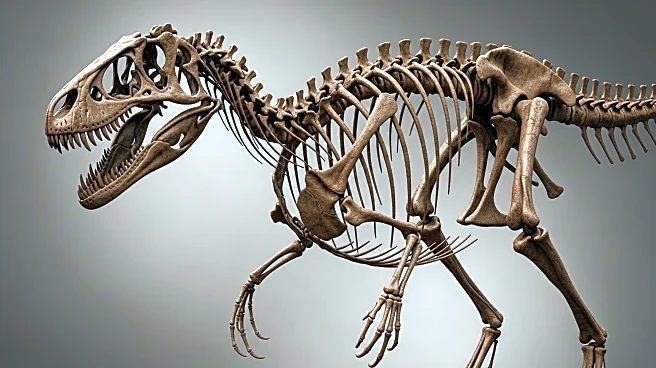What's Happening?
A new dinosaur species, Joaquinraptor casali, has been discovered in Argentina, providing insights into the predatory behavior of megaraptorans. This dinosaur, estimated to be 23 feet long, was found with a crocodile bone in its mouth, indicating it was consuming the creature when it died. The discovery was made in the Lago Colhué Huapi rock formation in Patagonia, where researchers uncovered parts of a skull, arm, leg, and tail bones. Joaquinraptor casali belonged to a group of dinosaurs known for their stretched-out skulls and powerful claws, which roamed South America, Australia, and parts of Asia. The findings, published in Nature Communications, suggest the dinosaur lived between 66 and 70 million years ago, close to the time of dinosaur extinction.
Why It's Important?
The discovery of Joaquinraptor casali is crucial for understanding the ecological dynamics of the Late Cretaceous period. Megaraptorans, including Joaquinraptor, were apex predators, and their presence in various regions indicates a complex evolutionary history. The complete skeleton provides valuable data on the physical characteristics and potential hunting strategies of these dinosaurs. This discovery contributes to the broader understanding of dinosaur biodiversity and the factors that influenced their survival and extinction. It also highlights the importance of paleontological research in uncovering the mysteries of prehistoric life.
What's Next?
Researchers plan to conduct further studies to determine the hunting methods and ecological roles of Joaquinraptor casali and other megaraptorans. Additional excavations in Patagonia may reveal more specimens, offering deeper insights into the paleoenvironmental conditions that supported these predators. The findings could lead to new theories about the evolutionary adaptations that allowed megaraptorans to thrive in diverse ecosystems.
Beyond the Headlines
The naming of Joaquinraptor casali in memory of the lead scientist's son, Joaquin, adds a poignant element to the discovery. This personal tribute underscores the emotional connections that can arise from scientific research, highlighting the human stories behind paleontological findings. The discovery also emphasizes the importance of preserving fossil sites and supporting scientific exploration to deepen the understanding of Earth's ancient history.








